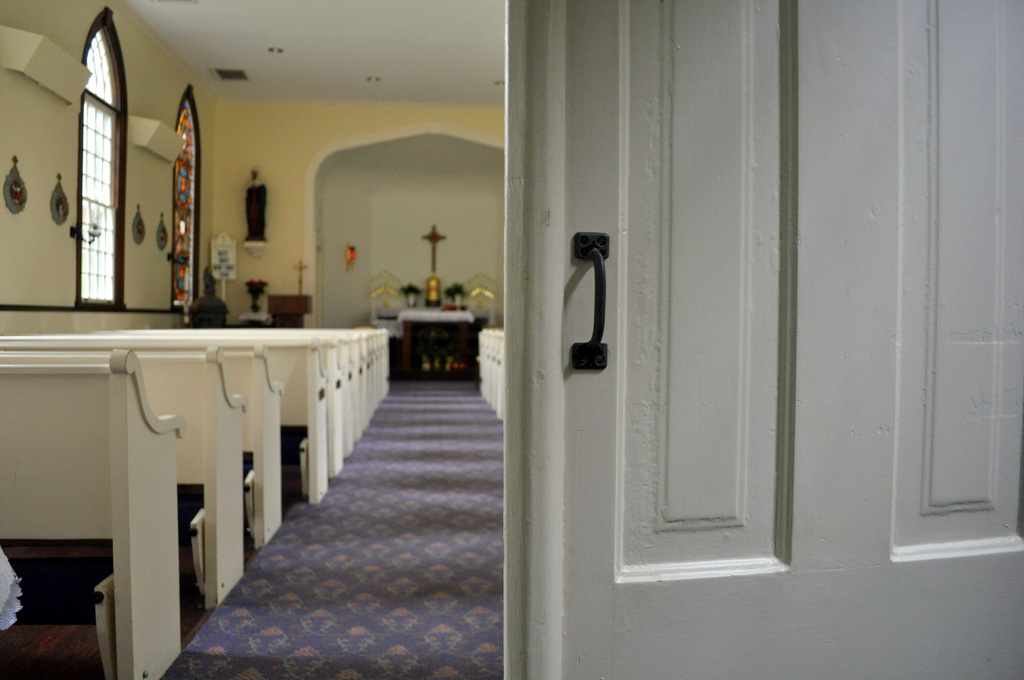|
Those of us in ministry often wonder if what we are doing counts, if it really matters, and if it will yield results in the long run. We try to mitigate our losses by assessing whether the people we are sinking our time into will give us a return on our investment. We want to pour into people who will take what we are giving them and actually do something with it, and not just let it run down the drain. Almost twenty years I stumbled across a ministry practice which has produced more results than anything else I have ever done in ministry. I was able to see lives changed, people grow, and passion flow in very positive directions. That ministry practice can be described in a couple ways and is very common in many churches: missions trip, service project, work project, or very commonly, ministry involvement.
Those many years ago, I led a missions trip from one side of the country to the other. I took eight students and one adult with me, ten of us. We made that same trip for ten years in a row, with more than seventy different students and incredible results. One student went on that trip with us ten years in a row. He is a pastor now. Another went for nine years, she is the pastor’s wife. Another seven years, he is a Christian Camp director. Another is a church elder, four others are youth workers, and on and on I could go. This week we've been talking about the Sunday morning experience. As pastors and church leaders, we have a desire for our gatherings to be special and meaningful, full of impact and energy. But the reality never quite lives up to the fantasy for 200churches, and unfortunately many of us hold ourselves up to standards that truly are impossible based on our facilities, our congregations, and, realistically, our budgets. How much does a fog machine cost?! While Jeff (who wrote Monday's post) was away to visit his daughter, I was taking a group of students on a service trip to Des Moines. While there, we attended my old church which meets in a school, has a very different style of worship than our church, and reaches a very different demographic than our congregation.
And that's the point. Every church is culturally situated. Every congregation, every building or meeting place, every Sunday morning service (or Saturday night, or Friday afternoon, or whatever group meeting time you might have) exists in a particular time and place, and has the ability to reach particular people because of that situation. Jeff's daughter's church is different than ours, but both can be healthy and vibrant communities. Neither is better than the other, each is simply suited better for its environment. So when we set out to create an amazing Sunday morning experience, what model are we using? Are we just trying to import what we saw at the latest conference or live-stream of our favorite mega-church pastor, or are we preparing for Sunday mornings that connect with our people and our specific community? Your church is boring. Probably to the majority of the people in the world. But to the people that God has given you to guide, and the people in your surrounding community, your church can be exactly what they want and need. That looks different for all of us, but it's our responsibility as pastors and leaders to discover what our community needs. No matter what our service looks like, the three areas we talked about Wednesday are still indispensable:
Put these three principles at the center of your Sunday morning experience, and it will have an impact on people. Church isn't meant to be boring, at least not for the people who faithfully attend yours!
Some unrealistic expectations we might have for our Sunday morning services include:
The foundation of all that we do in preparation for each Sunday morning worship service has got to be prayer. Is it prayer only? No. But it is prayer and... It must begin and end with prayer. We can do nothing spiritually effective without prayer and the empowerment and personal work of the Holy Spirit in us and through us.
With prayer as a foundational given, here are three expectations we can control: I did not attend my church today. I am visiting my Daughter and Son-in-law on the East Coast. We went to church with them this morning. On the way out of the parking lot, I remarked that going to their church was like going to the movies. Here’s why:
This week we've been looking at a few of the frustrations of leaders and, on Wednesday, on Episode 14, we talked about what we believe is one of the most important ways that leaders can smooth out some of those frustrations: investing in relationships. We looked at eight ways to build relational foundations with those you are leading in your organization. Today we’re going to expand on some of those ideas with practical ways to make those connections. Our first step toward building relationships was spending some one on one (or family on family) time outside of church with your leadership. When you do have this one on one time, we would encourage you to do it not only outside of church, but also outside of your home. There is a tension in asking someone over for dinner—for the host who has to prepare and the guest who has to be on their best behavior—that doesn't always make for the easiest “first date.” Instead, go out to dinner, or find a local sporting/entertainment event that would be fun for everyone involved. Nobody has home-field advantage, and hopefully everybody can drop their guard just a little bit.
Next, we talked about asking for input and actually listening to your leadership team. When you start a conversation, remind yourself that the goal is to keep an open mind and ear to the person you’re speaking with, not just to convince them of an agenda or direction you want to take. That means we don’t enter a conversation with our specific agenda in mind, but instead we really open ourselves up to hear where another person is coming from and their input into a project or situation. When we let our minds wander back to what we want, we stop listening and start strategizing our next move. This takes practice, but will pay dividends in the long run.
With our 200churches blog and podcast, our purpose is to encourage, support, and inspire pastors of smaller churches, churches that range anywhere from 20 to 200 or more. That’s it! That’s why we exist. Our podcast today aims to better equip you to build some serious, major league relationships with the members of your church board or leadership structure. We believe that if we are serious about leading our church, and growing our people, it all begins with our relationship with the church leaders. Real personal growth and life change happens best in relationship – in community.
We also believe in what Rick Warren has long stated: “All leaders are learners, when we stop learning, we stop leading.” Part of our learning is to listen to good podcasts and leadership lessons, and… enroll in graduate programs, but that’s another story! One of our favorite podcasts is the “This Is Your Life” podcast by Michael Hyatt. You can find it on iTunes and at www.michaelhyatt.com.
On last week’s podcast at michaelhyatt.com, titled The Three Components of Job Satisfaction, he took a question from Brent Dumler who asked, “What would you say to a 20-something church leader who finds him or herself in the midst of an unhealthy church? When would you advise them to start looking for something else?” In Michael’s answer, he talks about a young pastor who was frustrated with his board because they just “didn’t get it”. That question and Michael’s answer prompted this podcast about how, if we are not going to just bail and skip off to another church, we must build relationships with our boards if we are to have any hope of creating positive change, with them, in our church! We talk about what we think are perhaps the eight most important ways to build those healthy, trust-filled relationships with our church leaders. Here are the eight ways up front, and we hope you enjoy today’s podcast and are challenged to implement some of these practices right away in your 200church!
Young pastors learn something new every day. And if they don’t, they need to! There is so much to learn. In the process, they often whine about things in ministry that they don’t like, and that frustrate them. Here are five whines of young pastors that I have observed from others, but mostly know from experience! 1. My board doesn't get it. Often a young leader will come to a board member, or to a board meeting, with a pile of fresh ideas and new initiatives, and it seems like they all just get shot down before having a chance to fly. The pastor leaves dejected, discouraged, angry, and after repeated experiences like this in board meetings, resentful.
For most people, if it isn’t their idea, they are not excited about it. Once you’ve built relationships with your board members, the key is to lead and facilitate change in such a way that the ideas are their ideas, and not just yours. People get behind what they own, and they often easily own what they create, or what they are a part of creating. Before any initiative is introduced, there needs to be communication, vision casting, and relationship all happening ahead of time. Leadership guru John Maxwell says it like this: “You have to have a meeting before the meeting, and if you don’t, you‘ll likely have a meeting after the meeting since the meeting wasn’t very good because you didn’t have the meeting before the meeting.” I would say that you have to have communication and relationship before the meeting! 2. Our people are just focused on themselves. The truth is, everyone is focused on themselves as the default position. We are all selfish, self-centered, and self-absorbed naturally. It takes leaders to help a group of people move their attention and affection to others. Any kind of serious paradigm shift simply takes time, consistent encouragement, and the Holy Spirit. The more you talk about “the people who are not here yet” (as in, not in our church yet) and the more you purposefully direct your budget, resources, facilities, and calendar in the direction of others, the more your church family’s attention will turn to the community and outsiders. Again, don’t forget the spiritual dimension of the Holy Spirit. He loves the lost, and he will help you and your people to love outsiders – don’t forget to pray and talk to Him about this. Let's finish out this week of focusing on ministry in a 200church! Here are the top ten reasons I love doing ministry in my 200church... #10 – I can shape a culture and environment that will outlast me, if I stay long enough. In a larger church, no one person will define the culture or environment of the church, unless they are a very strong personality and overpower other leaders. In a small church, we can, over 5-10 years, strongly shape the culture, attitude, and ethos of a congregation. The longer the ministry, the better! #9 – These people need a pastor too, who will love them and lead them. If I ever feel like I should go elsewhere, I always remind myself that this church right here, these people, they need a pastor who will love them sincerely and genuinely and who will lead them both by Scripture and by example. #8 – I can be in touch with every ministry in my church, and those who lead them. I can involve myself personally as much or as little as I want to in every ministry in my church – and – I can build a relationship with the leaders of these ministries.
#7 – I am available to my church family. I have the time, mostly, to be available to a member of my church who has a need. Surely I can get to them in 24 hours or less and spend quality time with them. Their pastor can minister to them personally. #6 – The children in my church can have a relationship with their pastor. The kids in my church can know me personally. They can form their understanding of what a church is and what a pastor is through that personal connection. I love getting to know kids, and I love personally affirming and encouraging them!
We want to think that real, cutting edge ministry involves a MacBook Pro, hipster styles, multiple services with more volunteers than we can use, a high stool with a backrest, candles on the platform, communion bread from Israel, (or at least the Jewish bakery down the street!) a YouTube channel, a website, a blog, Twitter, Instagram, an iPhone, multiple Facebook accounts for each ministry, an iPad that wirelessly shoots your Keynote presentation to the ceiling mounted 18,000 lumens projector, an iPad Mini for the office, and 18 twenty-something staff members that run all the technology!
Oh, I forgot to mention the 35K blog subscribers, 137 people getting baptized every weekend in the outdoor patio baptismal, 114K Twitter followers, 28K Podcast listeners, and 9,000 attenders to the 14 different weekend worship services on three different sites. Oh yeah Baby. Now, that's REAL ministry!
Or not!
On this week's 200churches Podcast, Episode 13, we have as our guest Chris Nye, the High School Pastor at Wiliamette Christian Church in West Linn, Oregon. If you haven't yet read his Leadership Journal article titled The New Televangelists, go back and read it here, then listen to the Podcast and check out Chris' blog, and this video of Chris in action at his church! (my favorite quote from the video is "runt of the litter"!) You can email Chris Nye here. Enjoy the 200churches Podcast! And here is a bonus link just in case you wanted to click on another LINK! This week we are going to tackle the topic – What Real Ministry Looks Like. In light of the technology revolution of the past twenty years, giving us podcasts, blogs, Twitter, online video, streaming church services, Facebook, and YouTube channels, what does real, grassroots, rubber meets the road ministry really look like? Last month we read an article in the March online edition of Leadership Journal by a young pastor named Chris Nye. We call him Chris Nye the Ministry Guy! In his article, titled The New Televangelists, he talked about how the Internet was forming his vision of ministry when he said “But as I soaked up podcasts and sermon videos from famous pastors, I was unwittingly forming an inaccurate vision of the life of a pastor.”
Our purpose for 200churches.com is to affirm and encourage the pastors who lead and shepherd churches under 200 people – especially lay, bi-vocational, and solo pastors in churches under 100. These men and women are the real heroes of ministry, serving faithfully in rural, suburban, and urban churches where there is little recognition or notoriety. |
Welcome to the 200churches blog! We have hundreds of posts covering every issue imaginable. So pull up a chair, pour a cup of coffee, and stay awhile.
|













 RSS Feed
RSS Feed